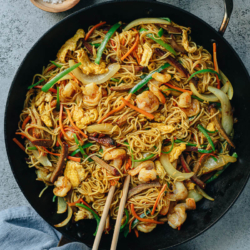Vermicelli Singapore style, a delectable dish originating from Southeast Asia, has gained immense popularity worldwide. This tantalizing noodle dish, characterized by its vibrant yellow hue and savory curry flavor, is a staple in many Asian cuisines.
Key Ingredients
The essence of vermicelli Singapore style lies in its harmonious blend of ingredients:
-
Rice Vermicelli Noodles: These thin, translucent noodles form the base of the dish, absorbing the rich flavors of the accompanying sauce.
-
Char Siu Pork: Marinated and roasted pork slices, adding a smoky and savory dimension to the dish.
-
Prawns: Succulent and tender, these seafood morsels elevate the dish with their briny sweetness.
-
Egg: A thin omelet, sliced and incorporated into the noodles, providing a textural contrast.
-
Vegetables: Typically bell peppers and carrots, adding color and crunch to the dish.
-
Curry Powder: The star ingredient, imparting the distinctive yellow hue and aromatic spice to the sauce.
Cooking Process
Preparing vermicelli Singapore style is a culinary dance, requiring precision and attention to detail:
-
Soak the Noodles: Submerge the rice vermicelli noodles in boiling water until softened, following the package instructions.
-
Cook the Proteins: Pan-fry the prawns and char siu pork separately, ensuring they are cooked through and slightly caramelized.
-
Make the Omelet: In a separate pan, create a thin omelet and slice it into strips.
-
Prepare the Sauce: Combine soy sauce, Chinese cooking wine, curry powder, sugar, and white pepper in a bowl.
-
Stir-Fry the Noodles: Heat oil in a wok or large skillet. Add the noodles, sauce, and vegetables. Toss until the noodles are evenly coated and heated through.
-
Incorporate the Proteins: Add the cooked prawns, char siu pork, and omelet strips to the wok. Toss to combine.
-
Serve Immediately: Transfer the vermicelli Singapore style to a serving dish and garnish with green onions or cilantro.
Variations and Substitutions
The beauty of vermicelli Singapore style lies in its adaptability. Feel free to experiment with these variations:
-
Protein Substitutions: Replace the char siu pork with chicken, ham, or tofu for a vegetarian option.
-
Vegetable Additions: Add bean sprouts, cabbage, or snow peas to enhance the nutritional value and texture.
-
Sauce Adjustments: Adjust the amount of curry powder to suit your spice preference. Add a touch of oyster sauce for a richer flavor.
Vermicelli Singapore style is a culinary masterpiece that tantalizes taste buds with its vibrant flavors and textures. Whether you’re a seasoned home cook or a novice in the kitchen, this dish is sure to impress. So gather your ingredients, follow the steps, and embark on a culinary journey to Southeast Asia with this delectable dish.
Other delicious noodle recipes you might like

Flexible protein ingredients
Char siu pork is a common choice of protein for Singapore noodles.
It’s quite handy when I have leftover homemade char siu BBQ pork on hand. But more often than not, I’d prefer to make dinner with whatever is in the refrigerator rather than rushing to an Asian market to buy char siu
Using ground pork (I also enjoy using ground turkey or ground chicken) that has been seasoned with a little salt is a fantastic alternative.
Bacon, leftover rotisserie chicken, or ham are other options.
BETTER THAN TAKEOUT – Singapore Noodles Recipe
FAQ
What does Singapore vermicelli taste like?
What is the difference between Singapore chow mein and Singapore vermicelli?
What is the difference between Singapore and Hong Kong noodles?
